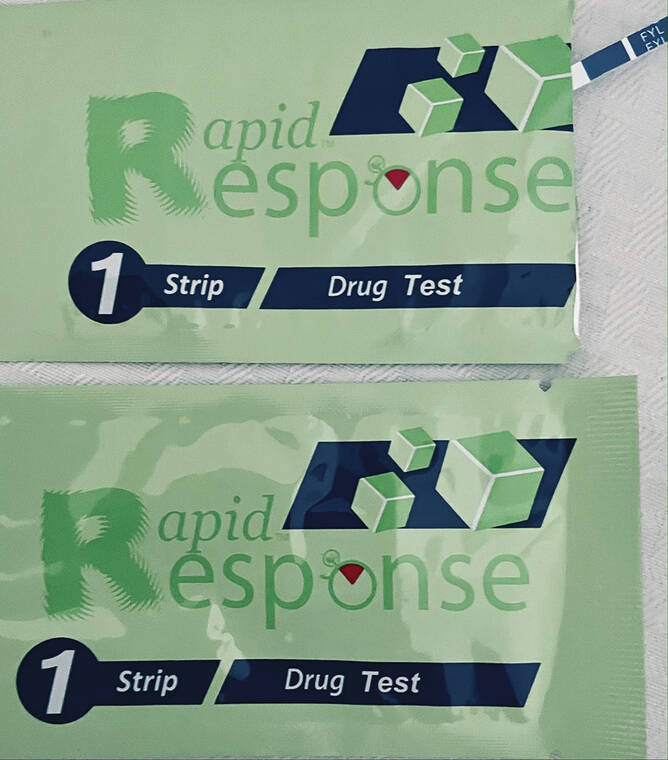The Hawaii Island Fentanyl Task Force has partnered with state Sen. Joy San Buenaventura of Puna to introduce legislation to legalize fentanyl test strips.
On the Big Island, one person dies every 11 days from a fentanyl overdose, according to data from the U.S. Centers for Disease Control and Prevention.
“These strips, which don’t promote addiction and do not promote drug use, actually prevent overdoses,” said San Buenaventura. “They will help those trying to wean themselves off of opioids test their products and can help prevent opioid deaths.”
The strips cost just $1 per strip and are easy to use. A small amount of any drug is dissolved in water, and the strip is dipped into the mixture. Within 15 seconds, the strip detects with 96% to 100% accuracy whether fentanyl is in a substance.
But according to Hawaii Revised Statutes, test strips fall under the “drug paraphernalia” category, making them illegal to possess or distribute. Violations can result in a $500 fine, although police Capt. Thomas Shopay of the Hawaii Police Department said criminal charges are rare due to lack of availability.
“The benefit is on the harm reduction side,” Shopay said. “Because of the prevalence of fentanyl within a lot of substances, having an informed knowledge of what you may be using — especially because of deadly consequences — is the idea behind making (the test trips) potentially legal.”
San Buenaventura is optimistic the legislation will pass.
“As far as I can tell, there has been no opposition,” she said.
Hawaii decriminalized drug paraphernalia back in 2017, reducing the penalty of being caught with items like test strips or rolling papers to a violation of no more than $500.
“The bill I’m introducing removes it from drug paraphernalia altogether, so that it won’t even be a violation,” said San Buenaventura, who also introduced the 2017 legislation.
The nonprofit Hawaii Health and Harm Reduction Center has been distributing fentanyl test strips in Hawaii since 2018 due to a written exemption provided to participants of its needle syringe exchange program.
In 2021, the group distributed 417 fentanyl test strips in Hawaii County, and 1,307 test strips statewide.
“Hawaii has seen the highest rates of fentanyl overdose in 2022 that we have ever seen, and we need every tool possible to save lives,” said Executive Director Heather Lusk. “The Centers for Disease Control and Prevention supports state and local efforts to increase access to fentanyl test strips.”
In April 2021, the CDC and the Substance Abuse and Mental Health Services Administration announced roughly $1.6 billion in federal funding to address the overdose crisis. But the funding cannot be used for drug paraphernalia, leaving fentanyl test strips off the table in Hawaii.
“Private entities that have federal grant funding can purchase the test strips, but unfortunately in Hawaii, they’re still illegal for distribution,” said Shopay. “So, that’s the catch-22 that our legislators might be working on.”
Members of the Fentanyl Task Force continue to stress that test strips can help with recovery and save lives.
“Harm reduction tools like Narcan and fentanyl test strips play a significant role in preventing drug-related deaths and offering access to health care, social services, and treatment while the individual is working to become drug or alcohol free,” said Task Force leader Dr. Kimo Alameda. “Not everybody can quit cold-turkey, and for certain addictions, it’s dangerous and possibly fatal to just stop without appropriate detoxification.”
The use of Narcan, a nasal spray that reverses the effects of an opioid overdose, is legally distributed for free at task force events throughout the community .
Because it is not used for “testing” or “analyzing,” Narcan is not considered drug paraphernalia. Due to Hawaii’s Good Samaritan Law, those providing Narcan at the scene of an accident also are protected legally.
Hawaii County Fire Department reported that up through Jan. 17 of this year, it responded to nine overdose cases, administering Narcan on seven occasions, resulting in six positive outcomes.
“Throughout these years, I’ve seen so many deaths,” said Michelle Kobayashi, a recovering addict who volunteers throughout the Hilo community and helps others navigate both treatment and recovery.
Four years ago she lost her nephew to a fentanyl overdose, and two months ago, she lost two more friends to fentanyl.
“I’m sure the strips will save lives,” she said. “And there’s a demand for them.”
Because just 2 milligrams of fentanyl is considered a lethal dose, many individuals in Hawaii County have unknowingly ingested the drug as it continues to appear in pressed pills, powders and in block forms. With a potency 50 times stronger than heroin and 100 times stronger than morphine, just one tainted pill can result in an overdose.
“I know we can all make a difference out there, but we need help,” Kobayashi said. “We need those strips,and we need Narcan, they will save people’s lives.”
Email Grant Phillips at gphillips@hawaiitribune-herald.com.






